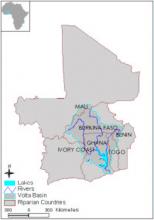Informations générale

Données de base
Total Rainfall: Varies from 400 mm/year in the North to 1800 mm/year in the coastal zone.
Total Evaporation: Varies from 2500 mm/year 71 in the North to 1800 mm/year in the coastal zone.
The total irrigation potential spread over the six Riparian Countries is estimated at about 1.5 million ha.
This, with some irrigated agriculture is the principal means of development for the people of the basin.
Site Internet
Couverture géographique
| Pays | Superficie |
|---|---|
|
Bénin
|
14987km²
|
|
Burkina Faso
|
173800km²
|
|
Ghana
|
165600km²
|
|
Côte d'Ivoire
|
13413km²
|
|
Mali
|
18920km²
|
|
Togo
|
25875km²
|
Fonction/mandat
The main objective of the VBI is the promotion of public involvement in the establishment of joint management of the Volta basin water resources through the VBTC which is basically a consultative body. VBTC is expected to perform activities such as identifying issues and obstacles in the establishment of a Volta Basin body; collecting, pooling and exchanging all relevant information; advising national authorities; and directing partner support for the setting up of the basin body. More specific objectives seek to give a better understanding of the basin water resources and trans-border problems and establishment of a mechanism enabling proper decision-making to take into account aspirations and needs of basin civil society in the cooperation effort.
Fonctionnement
The planned programs so far include the Onchocerciasis Control Program in the Volta River Basin area involving the World Health Organization, Benin, Ghana, Ivory Coast, Mali, Niger, Togo, and Upper Volta, a regional program to combat desertification including the sustainable management of transboundary water resources and the alternative energy supply program. Other sub-regional programs that were ear-marked include the West African Process on Integrated Water Resources Management of ECOWAS, Interstate Sub-regional Action Plan (PASR) and the West African Technical Advisory Committee (WATAC) of the Global Water Partnership (GWP). The Green Cross Water for Peace project was uniquely designed to ensure the full and active involvement of civil society representatives across the basin in the development of basin principles, agreements and management policies. VBI was supposed to coordinate meetings between experts, political leaders, international organizations involved in the Volta basin and representatives of civil society from across the basin to gather proposals on how best to manage the common basin water resources for the equitable benefit of all.
The organization had plans to create a permanent information sharing system for shared water resources for the assessment of availability, needs and risks through the Green Cross project. The Green Cross Project was supposed to be the architect of new and enhanced channels of communication between and among civil society representatives and riparian governments. It is the voice of the people.
The prevention of conflicts, promotion of dialogue between the actors at the level of one or several countries are the principal objectives of the Green Cross project.
Funding of the organization relies heavily on international donors with local funds coming in a way of some contributions to specific projects and funds raised locally through ex royalties and user-polluter payments.
The Green Cross Peace Project ensures the involvement of civil society representative in basin activities.
At the West African Conference on Integrated Water Resources Management, held in Ouagadougou in March 1998, the Ministers for Environment and Water Resources of West Africa called for the integrated management of water resources, both at national and regional level of shared river basins, to support social and economic development of the countries in the sub-region. To follow-up the recommendations of the Conference, the Ministers set up a Ministerial Committee with a Secretariat provided by the Government of Burkina Faso. At a meeting of the Ministerial Follow-up Committee held in Burkina Faso in March 2000, the Ministers for Environment and Water Resources approved a mediumterm (2000-2004) Regional Action Plan for integrated water resources management. The Regional Action Plan included six programs that provide, among other things, support for developing regional coordination and creating or revitalizing collaborative frameworks between Riparian Countries for the management of shared basins. The ministers approved a project for creating a permanent structure for co-ordination and monitoring within the Economic Community of West African States (ECOWAS). In July 2004, an expert meeting of the six riparian states met in Ouagadougou, Burkina Faso, and resolved to establish a Volta Basin Technical Committee. The proposal awaits ministerial approval.
Bases légales
| Date | Nom du traité | Signataires | Bassin |
|---|---|---|---|
|
2004-01-01
|
VBTC Proposal
|
Benin
Ghana
Ivory Coast
Mali
Togo
Burkina faso
|
Bassin de la Volta
|
|
1906-06-01
|
Exchange of Notes on Sudad Boundary
|
France
Great Britain
|
- |
 AWIS/Sadieau
AWIS/Sadieau